| Srl | Item |
| 1 |
ID:
139278
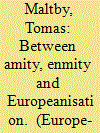

|
|
|
|
|
| Summary/Abstract |
Considering the development of the Bulgarian energy security strategy this article analyses how the country has adapted to EU membership and to energy security challenges, such as disruptions to Russian gas supplies in 2006 and 2009 and rising gas prices. Utilising a conceptual lens which synthesises Regional Security Complex Theory and Europeanisation, the article offers an explanation of energy policy changes. It concludes that conceptions of Russia as an energy security guarantor have changed since Bulgaria's EU accession and that Bulgarian energy policy has undergone a qualified reorientation away from a positive dependence on Russian energy sources, towards a convergence with EU priorities of diversification and a single energy market.
|
|
|
|
|
|
|
|
|
|
|
|
|
|
|
|
| 2 |
ID:
139276
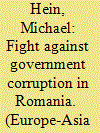

|
|
|
|
|
| Summary/Abstract |
The fight against political, especially government, corruption has dominated Romanian political discourse for many years. However, the vast majority of the political elite have continuously opposed the prosecution and conviction of defendants of corruption crimes. After a long constitutional conflict that seriously inhibited the fight against government corruption between 2006 and 2009, law enforcement agencies finally began to experience some success. Nevertheless, the extent of government corruption has remained consistently high. This article analyses the struggles that have occurred between 2004 and 2013 in the fight against government corruption in Romania and particularly examines the interplay between formal and informal factors in this field.
|
|
|
|
|
|
|
|
|
|
|
|
|
|
|
|
| 3 |
ID:
139274
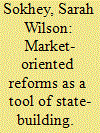

|
|
|
|
|
| Summary/Abstract |
Despite domestic opposition and several policy alternatives, in 2001 the Russian government adopted a pension reform that was potentially costly and had uncertain long-term benefits. Demographic and fiscal pressures created the desire to reform and a more cooperative Duma made it possible to do so. These points do not explain why Putin chose the pension privatisation option. Russia's pension reform is best understood as part of a state-building strategy to diminish the role of powerful bureaucracies. Russia's welfare state was not merely the product of a powerful and popular president, but rather a tool to create a stronger executive.
|
|
|
|
|
|
|
|
|
|
|
|
|
|
|
|
| 4 |
ID:
139277
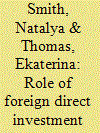

|
|
|
|
|
| Summary/Abstract |
This article explores the linkage between foreign direct investment, grand corruption (that is, state capture) and innovation in Russia's regions in between 1997 and 2010. The results indicate that during the period under investigation both foreign direct investment and state capture were the significant determinants of innovation outcome. What is also interesting is that a positive impact of state capture on innovation through foreign firms, and a negative impact-through exporting-was observed.
|
|
|
|
|
|
|
|
|
|
|
|
|
|
|
|
| 5 |
ID:
139275
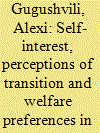

|
|
|
|
|
| Summary/Abstract |
This article studies public welfare preferences in Armenia, Azerbaijan, Belarus, Georgia, Moldova and Ukraine. Generalised ordered logistic regression models and predicted probabilities are employed to analyse comparable attitudinal survey data. The results vary considerably among the countries, but age is the most important covariate of welfare preferences, followed by individuals' socio-economic characteristics. The findings also indicate that popular perceptions of transition, notably in Ukraine and Moldova, are most strongly linked to preferences concerning the state's involvement in reducing the gap between the rich and the poor rather than to preferences regarding the main welfare state programmes such as pensions and healthcare.
|
|
|
|
|
|
|
|
|
|
|
|
|
|
|
|